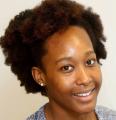
AS a mother of mixed-race children, Daisy Anna Lee’s obligation is to nurture daughters who appreciate their dual heritage.
But as a British Jewish woman who grew up on the Essex Suffolk border, she accepts there are aspects of their Senegalese roots she is ill-equipped to instil in them.
She said: “Taking my daughters to Black History events is really important to me because they can learn things about their ancestry and personal identity which I can’t teach them as a white mother. Things about their identity and cultural heritage.
“There’s a lot of women raising black and mixed heritage children not knowing how to look after their hair or skin sometimes, not really understanding their cosmetic needs - but this is superficial.
“What I’m more interested in is my children have a sense of identity, are proud of themselves as individual human beings and as members of various social groups.
“Cultural identity is important to a sense of self and interaction with others, and growing up in Britain I feel it’s important for them to know their African heritage, which is what I want to support for my children.”
Rochaya, 12, was just two-years-old when Daisy joined the organising committee of Black History Month Colchester in 2007. Her second daughter Aicha is six and they now all live in Ipswich, having left East Bergholt in 2008.
Being on board was a way for the events producer, 43, to build a network of like-minded people around her family and to access cultural education.
As an agent for African musicians at the time, Daisy was already encouraging venues to book more diverse bands, which is when she discovered how little they knew of the annual festival.
READ MORE: THE EVOLUTION OF BLACK HISTORY MONTH COLCHESTER

Award-winning children's author Trish Cooke reading to children at Essex University Day Nursery in 2011 as part of BHM
“October is a way to assess the level of inclusion which is important in the cultural sector. It’s also a good time to assess where progress is being made,” she said.
“But people must understand Black History Month came about through a gap in the education system, which wasn’t teaching that part of history because we, as white people, don’t look good in it.
“There’s an African proverb which says, ‘The hunter will never tell the lion’s story’. This one month gives the chance for melanin-rich people to talk publicly about a part of history that’s really traumatic for everybody.
“But, of course, important discussions should take place all year round.”
This year’s programme extends until November 15 with a talk from Professor Ana Lucia Arajo titled, Memory and Reparations for Slavery, at Essex University.
The university's African and Caribbean Society is holding mental health talks and a heritage showcase, plus there is an exhibition at the Level Best Art Cafe until October 14.

A previous year's workshop onboard Firstsite's art bus
She said: “It’s also about redefining what people think when they hear of Black History Month because it’s not just about slavery, it’s a great opportunity to explore the art, music and theatre from Africa, the Caribbean, and British people whose families descended from those places.
“History is central to each BHM programme but it’s also a great time for events which seek to create more understanding about contemporary issues.”
Daisy stepped down from the committee in 2010, but the event will always represent education, inclusion and a celebration of achievement.
In her opinion, black history is shared history.
She added: “I think we all have a part to play in rebalancing the world and making sure everybody has equal opportunities – that’s important for all of us.”



Comments: Our rules
We want our comments to be a lively and valuable part of our community - a place where readers can debate and engage with the most important local issues. The ability to comment on our stories is a privilege, not a right, however, and that privilege may be withdrawn if it is abused or misused.
Please report any comments that break our rules.
Read the rules hereLast Updated:
Report this comment Cancel